土木工程专业英语文章
关于土木工程英语作文
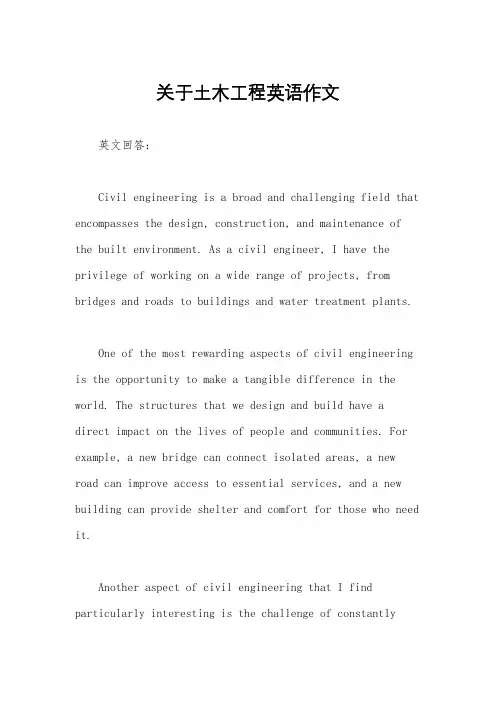
关于土木工程英语作文英文回答:Civil engineering is a broad and challenging field that encompasses the design, construction, and maintenance of the built environment. As a civil engineer, I have the privilege of working on a wide range of projects, from bridges and roads to buildings and water treatment plants.One of the most rewarding aspects of civil engineering is the opportunity to make a tangible difference in the world. The structures that we design and build have adirect impact on the lives of people and communities. For example, a new bridge can connect isolated areas, a new road can improve access to essential services, and a new building can provide shelter and comfort for those who need it.Another aspect of civil engineering that I find particularly interesting is the challenge of constantlyinnovating. The field is constantly evolving, and new technologies and materials are emerging all the time. This means that civil engineers must be adaptable and willing to learn new things.Of course, civil engineering is not without its challenges. One of the biggest challenges is the need to balance the competing demands of safety, cost, and sustainability. Civil engineers must be able to design structures that are safe and reliable, but they must also be mindful of the cost of construction and the environmental impact of the materials used.Another challenge is the need to work with a variety of stakeholders, including clients, architects, contractors, and government agencies. Civil engineers must be able to communicate effectively with all of these stakeholders to ensure that the project is completed successfully.Despite the challenges, civil engineering is a rewarding and fulfilling career. I am proud to be a part of a profession that makes a real difference in the world.中文回答:土木工程是一个既广泛又富有挑战性的领域,涵盖了建造环境的设计、建造和维护。
关于土木工程专业的英文作文开头
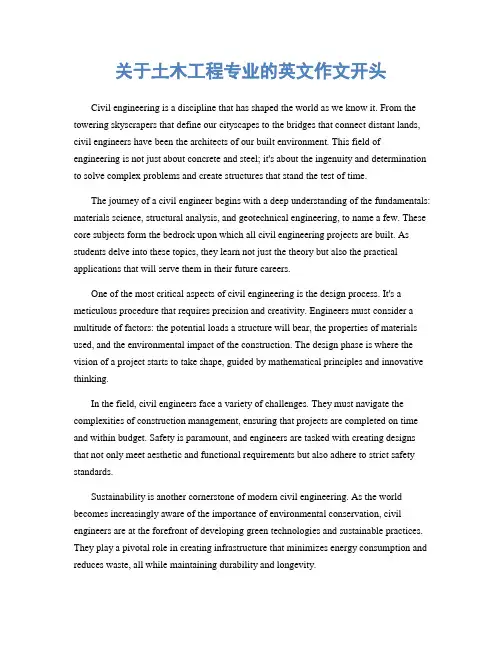
关于土木工程专业的英文作文开头Civil engineering is a discipline that has shaped the world as we know it. From the towering skyscrapers that define our cityscapes to the bridges that connect distant lands, civil engineers have been the architects of our built environment. This field of engineering is not just about concrete and steel; it's about the ingenuity and determination to solve complex problems and create structures that stand the test of time.The journey of a civil engineer begins with a deep understanding of the fundamentals: materials science, structural analysis, and geotechnical engineering, to name a few. These core subjects form the bedrock upon which all civil engineering projects are built. As students delve into these topics, they learn not just the theory but also the practical applications that will serve them in their future careers.One of the most critical aspects of civil engineering is the design process. It's a meticulous procedure that requires precision and creativity. Engineers must consider a multitude of factors: the potential loads a structure will bear, the properties of materials used, and the environmental impact of the construction. The design phase is where the vision of a project starts to take shape, guided by mathematical principles and innovative thinking.In the field, civil engineers face a variety of challenges. They must navigate the complexities of construction management, ensuring that projects are completed on time and within budget. Safety is paramount, and engineers are tasked with creating designs that not only meet aesthetic and functional requirements but also adhere to strict safety standards.Sustainability is another cornerstone of modern civil engineering. As the world becomes increasingly aware of the importance of environmental conservation, civil engineers are at the forefront of developing green technologies and sustainable practices. They play a pivotal role in creating infrastructure that minimizes energy consumption and reduces waste, all while maintaining durability and longevity.The impact of civil engineering can be seen in the infrastructure that supports our daily lives. Roads, tunnels, water supply systems, and waste management facilities are all products of civil engineering expertise. These structures are vital to the functioning of society, and their maintenance and improvement require continuous innovation and dedication.Civil engineering is also about collaboration. Projects often involve a diverse team of professionals, including architects, urban planners, and environmental scientists. Effective communication and teamwork are essential to bring complex projects to fruition. Each member brings a unique perspective and set of skills to the table, and it's the integration of these that leads to successful outcomes.As technology advances, civil engineering continues to evolve. The advent of computer-aided design (CAD) and building information modeling (BIM) has revolutionized the way engineers work. These tools allow for more precise designs and the ability to simulate and analyze various aspects of a project before the first shovel hits the ground.The future of civil engineering is bright, with new materials and technologies paving the way for even more ambitious projects. Smart materials that can adapt to changing conditions, advanced construction techniques that allow for faster and safer building processes, and the integration of renewable energy sources are just a few of the innovations shaping the future of the field.In conclusion, civil engineering is a profession that demands a blend of technical knowledge, creativity, and a passion for problem-solving. It's a career that offers the opportunity to leave a lasting legacy, to contribute to the development of society, and to be part of a profession that is constantly pushing the boundaries of what is possible. As we look to the future, civil engineers will undoubtedly continue to be the builders of dreams, the guardians of public safety, and the stewards of our planet. 。
土木工程专业英语的认识英语作文
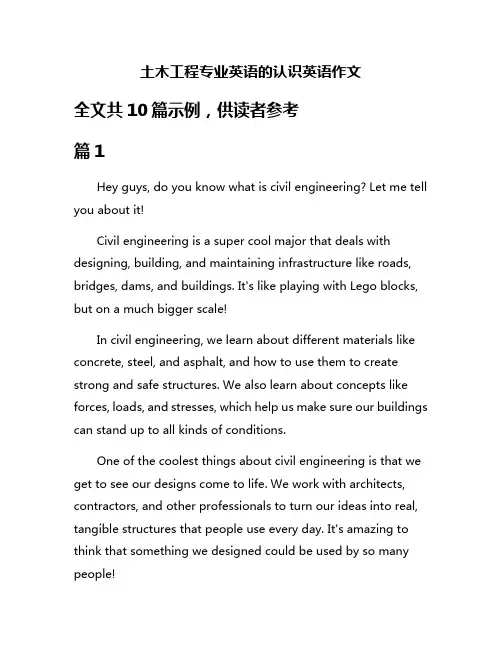
土木工程专业英语的认识英语作文全文共10篇示例,供读者参考篇1Hey guys, do you know what is civil engineering? Let me tell you about it!Civil engineering is a super cool major that deals with designing, building, and maintaining infrastructure like roads, bridges, dams, and buildings. It's like playing with Lego blocks, but on a much bigger scale!In civil engineering, we learn about different materials like concrete, steel, and asphalt, and how to use them to create strong and safe structures. We also learn about concepts like forces, loads, and stresses, which help us make sure our buildings can stand up to all kinds of conditions.One of the coolest things about civil engineering is that we get to see our designs come to life. We work with architects, contractors, and other professionals to turn our ideas into real, tangible structures that people use every day. It's amazing to think that something we designed could be used by so many people!Civil engineering is also important for keeping people safe. We have to make sure that our buildings and infrastructure are built to withstand earthquakes, floods, and other natural disasters. It's a big responsibility, but it's also really rewarding to know that our work is making a difference in people's lives.So, if you like building things, solving problems, and making the world a better place, then civil engineering might be the perfect major for you. It's challenging, it's fun, and it's a great way to use your creativity and skills to create something amazing. Give it a try!篇2Yo guys! Today I wanna talk about something super interesting - Civil Engineering! Have you guys heard about it before? Well, if not, don't worry because I'm here to tell you all about it.So basically, Civil Engineering is all about designing and building stuff like bridges, roads, buildings, and dams. Pretty cool, right? It's like playing with giant Lego blocks but in real life! Civil engineers use their knowledge of math, science, and technology to make sure everything is strong, safe, and works the way it's supposed to. They have to think about things likehow much weight a bridge can hold or how deep a foundation needs to be for a tall building. It's a lot of hard work but also super fun!One of the cool things about Civil Engineering is that you get to see your projects come to life. Imagine driving over a bridge that you helped design or walking into a building that you helped build - how cool is that? And not only that, but Civil Engineering is also important for keeping people safe and improving our communities. So if you like being creative, solving problems, and making a difference in the world, then Civil Engineering might be the perfect job for you!In conclusion, Civil Engineering is an awesome field that involves designing and building things like bridges, roads, and buildings. It requires a lot of hard work and thinking but it's also super rewarding. If you're interested in math, science, and technology and want to make a positive impact on the world, then you should definitely consider a career in Civil Engineering. Who knows, maybe one day you'll be the one designing the next iconic landmark in your city!篇3Title: My Understanding of Civil Engineering in a Fun and Simple WayHey guys, have you ever heard of civil engineering? It may sound a bit boring, but trust me, it's super cool and important! Let me tell you all about it in a fun and simple way.So, what is civil engineering? Well, it's all about building stuff like roads, bridges, and buildings. Civil engineers design and plan these things to make sure they are safe, strong, and can last for a long time. They also make sure everything is built in the right place and follows the rules and regulations.One of the coolest things about civil engineering is that you get to use math and science to solve real-life problems. For example, when building a bridge, civil engineers have to calculate the right size and shape of the materials to make sure the bridge can support the weight of cars and trucks.Another fun fact about civil engineering is that it's not just about building stuff. Civil engineers also help protect the environment by designing projects that are sustainable and eco-friendly. They also work to improve the quality of life for people by creating safe and efficient infrastructure.In conclusion, civil engineering is an amazing field that combines creativity, problem-solving skills, and a passion for making the world a better place. If you love building things and want to make a positive impact on society, then civil engineering might be the perfect career for you. So, next time you see a building or a bridge, remember that it was probably designed and built by a team of awesome civil engineers!篇4Oh my gosh, have you guys heard about this thing called Civil Engineering? It sounds super cool and interesting! Let me tell you all about it in a fun and easy way!So, Civil Engineering is basically all about building stuff like bridges, roads, buildings, and all sorts of cool structures. It's like being a real-life Lego master! You get to use your creativity and problem-solving skills to design and construct things that help people in their everyday lives.One of the things that Civil Engineers do is make sure that structures are safe and sturdy. They have to think about things like the materials they use, the environment they're building in, and how to make everything strong and durable. It's like being asuperhero, but instead of fighting bad guys, you're saving the day with your awesome building skills!Another cool thing about Civil Engineering is that you get to work with a bunch of different people. You'll collaborate with architects, construction workers, and other engineers to bring your designs to life. It's like being part of a big team where everyone has a special role to play.So, if you love building things, solving puzzles, and working with others, then Civil Engineering might be the perfect career for you. Who knows, maybe one day you'll design the next amazing skyscraper or build a bridge that connects two cities. The possibilities are endless!In conclusion, Civil Engineering is an exciting and rewarding field that lets you be creative, solve problems, and make a real impact on the world around you. So, if you're up for a fun and challenging adventure, then why not give it a try? You could be the next big Civil Engineer superstar!篇5Oh! Hi everyone! Today I want to talk about something super cool - Civil Engineering!So, like, civil engineering is all about building and stuff. It's like, using science and math to design and construct things like buildings, bridges, roads, and even airports! It's, like, super important because without civil engineers, we wouldn't have all the awesome buildings and structures that we use every day.I learned that civil engineers have to be really good at math and science. They have to study things like physics, chemistry, and calculus. It's, like, really hard work but also super fun because you get to build things and make them safe for everyone to use.One of the things that civil engineers have to think about is, like, making sure that buildings and bridges are strong and won't fall down. They have to use materials like concrete and steel to make sure everything is safe and sturdy. They also have to think about things like the environment, making sure that their projects are good for the earth.I think civil engineering is, like, so cool because you get to use your brain to create amazing things that help people every day. I hope to be a civil engineer one day and build awesome stuff for everyone to enjoy!So, yeah, that's my super fun and cool essay about civil engineering. I hope you liked it! Thank you for reading!篇6Title: My Understanding of Civil EngineeringHey guys! Today I want to talk about this super cool and important thing called civil engineering. I know it sounds like a big word, but trust me, it's not that hard to understand once you get the hang of it.So, what is civil engineering? Basically, it's all about designing and building stuff like roads, bridges, buildings, and even dams. Civil engineers are like the superheroes of the construction world, making sure everything is safe and strong for us to use.One of the things I find really fascinating about civil engineering is how it combines science and creativity. You have to use math and physics to calculate loads and stresses, but you also get to be creative and come up with cool designs that look good and work well.Another important aspect of civil engineering is making sure that the things we build are safe for the environment. We have to think about things like how our structures will affect the land, water, and air around them. It's like being a guardian of the planet!In conclusion, civil engineering is all about making the world a better place by building things that help people and protect the environment. It's a super important job, and I think it's really cool that people get to do it every day. Who knows, maybe one day I'll become a civil engineer too!篇7Hello everyone, today I want to talk about civil engineering in a fun and easy way. So, what is civil engineering? It's like building stuff, like houses, bridges, and roads. It's a super cool job because you get to make things that people use every day.Civil engineers have to know a lot of stuff to do their job right. They have to learn about math, science, and how materials work. They also have to think about the environment and how their projects will affect it. That's why civil engineers are like superheroes, they save the day by building things that make our lives better!One of the most important things civil engineers do is designing structures that are safe and strong. They have to make sure buildings won't fall down in an earthquake or that bridges can hold up lots of cars. It's really important work because people's lives depend on it.Civil engineering is a great career choice for anyone who likes to be creative and solve problems. Plus, it's a job where you get to see the results of your hard work every day. So, if you like building things and making a difference in the world, maybe civil engineering is the job for you!篇8Oh wow, do you know what a civil engineering major is? Let me tell you all about it!Civil engineering is all about building stuff like bridges, roads, and buildings. It's like being a super cool architect who actually gets to make the stuff they design. You get to use all kinds of tools and machines to make sure everything is strong and safe.One really important thing civil engineers do is make sure everything is built in a way that won't fall down or break. They use math and science to make sure the buildings are strong enough to handle everything that comes their way.Another cool thing about civil engineering is that you get to work on all different kinds of projects. One day you might be designing a new highway and the next day you could be working on a skyscraper. It's always something new and exciting!Overall, civil engineering is all about making the world a better and safer place to live. It's a super important job and I think it would be really fun to do someday. Who knows, maybe one day I'll be the one designing a giant bridge that everyone uses!篇9Hey guys! Today I'm gonna talk to you about Civil Engineering! It's a super cool field where people design and build things like bridges, roads, and buildings. It's like playing with giant Lego blocks, but way more serious!So, what exactly do civil engineers do? Well, they use math, science, and technology to come up with plans for all kinds of structures. They have to make sure everything is safe, strong, and will last a long time. It's a big responsibility, but it's also really exciting!One of the coolest things about civil engineering is that you get to see your ideas come to life. You work with a team of professionals to bring projects from the planning stage to actually building them. It's like being a superhero, but instead of fighting bad guys, you're creating amazing things that help people every day.And if you're into the environment, civil engineering is a great choice. Engineers are always looking for ways to build things that are eco-friendly and sustainable. They want to protect the planet while still making sure we have all the things we need to live comfortably.So, if you're interested in math, science, and making the world a better place, maybe civil engineering is the right career for you! It's a challenging but rewarding field that lets you use your brainpower to create awesome stuff. So go out there and start building your future in civil engineering!篇10Hi everyone, today I want to talk about Civil Engineering, which is a very cool field in the world!First of all, what is Civil Engineering? Well, it's all about building things like roads, bridges, buildings, and even big dams! Civil engineers make sure that everything is safe and strong. They also make sure that our environment is protected while building these things.One of the most important things in Civil Engineering is math. You have to be good at math to make sure all themeasurements are right and everything fits perfectly. You also have to be creative and think of new ways to solve problems.Civil engineers work with a lot of different tools and machines. They use things like computers, surveying equipment, and even big cranes! It's like being a superhero but with cool gadgets.Another important thing in Civil Engineering is teamwork. You have to work together with other engineers, architects, and construction workers to make sure everything is done perfectly. It's like being part of a big family where everyone helps each other.In conclusion, Civil Engineering is a super cool field where you get to build amazing things and make the world a better place. If you like math, science, and working with others, then this might be the perfect job for you! So, let's all become future Civil Engineers and make the world a safer and more beautiful place!。
土木工程英语作文模板及范文
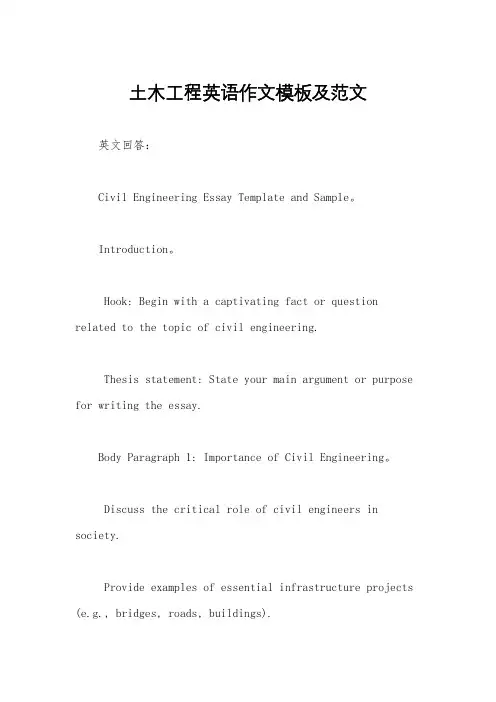
土木工程英语作文模板及范文英文回答:Civil Engineering Essay Template and Sample。
Introduction。
Hook: Begin with a captivating fact or question related to the topic of civil engineering.Thesis statement: State your main argument or purpose for writing the essay.Body Paragraph 1: Importance of Civil Engineering。
Discuss the critical role of civil engineers in society.Provide examples of essential infrastructure projects (e.g., bridges, roads, buildings).Explain how these projects enhance quality of life and economic growth.Body Paragraph 2: Challenges in Civil Engineering。
Identify common challenges faced by civil engineers, such as environmental concerns, design complexities, and cost constraints.Discuss how these challenges require innovative solutions and collaboration.Body Paragraph 3: Technological Advancements。
Describe emerging technologies that are transforming civil engineering practices.Examples could include BIM (Building Information Modeling), drone surveys, and advanced materials.Explain how these advancements enhance efficiency,accuracy, and sustainability.Body Paragraph 4: Case Study。
土木工程专业英语文选
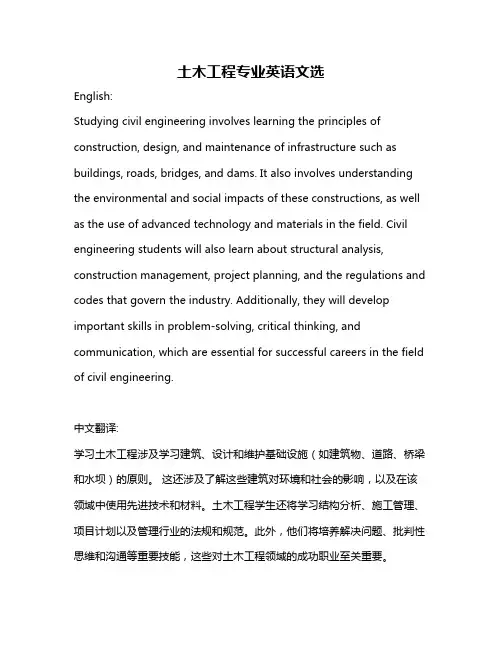
土木工程专业英语文选English:Studying civil engineering involves learning the principles of construction, design, and maintenance of infrastructure such as buildings, roads, bridges, and dams. It also involves understanding the environmental and social impacts of these constructions, as well as the use of advanced technology and materials in the field. Civil engineering students will also learn about structural analysis, construction management, project planning, and the regulations and codes that govern the industry. Additionally, they will develop important skills in problem-solving, critical thinking, and communication, which are essential for successful careers in the field of civil engineering.中文翻译:学习土木工程涉及学习建筑、设计和维护基础设施(如建筑物、道路、桥梁和水坝)的原则。
这还涉及了解这些建筑对环境和社会的影响,以及在该领域中使用先进技术和材料。
土木工程学生还将学习结构分析、施工管理、项目计划以及管理行业的法规和规范。
为什么选择土木工程专业英语作文
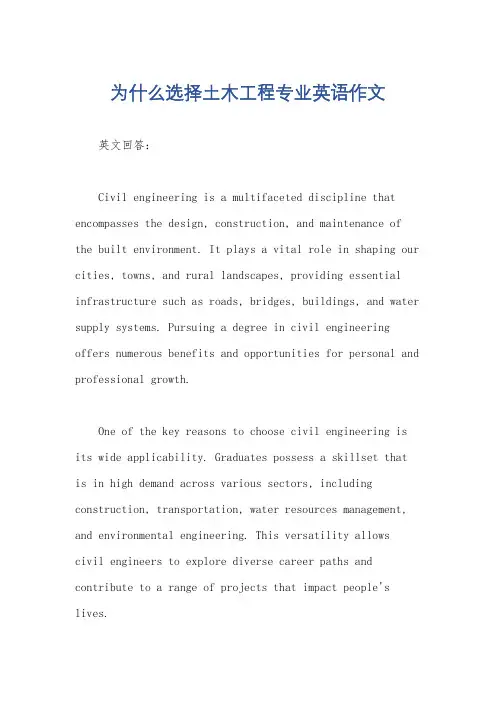
为什么选择土木工程专业英语作文英文回答:Civil engineering is a multifaceted discipline that encompasses the design, construction, and maintenance of the built environment. It plays a vital role in shaping our cities, towns, and rural landscapes, providing essential infrastructure such as roads, bridges, buildings, and water supply systems. Pursuing a degree in civil engineering offers numerous benefits and opportunities for personal and professional growth.One of the key reasons to choose civil engineering is its wide applicability. Graduates possess a skillset that is in high demand across various sectors, including construction, transportation, water resources management, and environmental engineering. This versatility allowscivil engineers to explore diverse career paths and contribute to a range of projects that impact people's lives.Moreover, civil engineering is a challenging and rewarding field that requires problem-solving skills, creativity, and attention to detail. It encourages students to develop analytical and critical thinking abilities, fostering a mindset that is adaptable to tackling complex engineering challenges. By working on real-world projects, civil engineers witness the tangible impact of their work and gain a sense of accomplishment in contributing to the built environment.Additionally, civil engineering offers excellent career prospects. The industry is constantly evolving, driven by advancements in technology and changing societal needs. This dynamic landscape presents opportunities for lifelong learning, specialization, and career advancement. Civil engineers can pursue leadership roles, manage large-scale projects, and become experts in specialized areas such as structural engineering, geotechnical engineering, or sustainable design.Furthermore, civil engineering is a profession thataligns with the values of sustainability and social responsibility. Civil engineers play a crucial role in designing and constructing infrastructure that meets the present needs of society while safeguarding the environment for future generations. They strive to create sustainable solutions that minimize environmental impact, conserve resources, and enhance the well-being of communities.In summary, choosing civil engineering as a majoroffers numerous benefits and opportunities for personal and professional growth. Its wide applicability, challenging nature, excellent career prospects, and alignment with the values of sustainability and social responsibility make it an attractive field for those seeking a fulfilling and rewarding career in engineering.中文回答:选择土木工程专业的原因有很多。
土木工程专业英文汇总范文
土木工程专业英文汇总范文Title: The Essence of Civil Engineering: A Comprehensive Overview.Civil engineering, a vast and diverse field, encompasses the design, construction, and maintenance of the infrastructure that shapes our world. It is the backbone of modern society, responsible for creating the environments where we live, work, and play. From thetallest skyscrapers to the deepest underwater tunnels, the impact of civil engineering is felt everywhere.Origins and Evolution.The roots of civil engineering can be traced back to ancient times, when early civilizations constructed irrigation systems, roads, and bridges. However, it was during the Industrial Revolution that the field truly began to take shape. With the advent of new materials and technologies, engineers were able to build larger and morecomplex structures, leading to the creation of the modern-day infrastructure we know today.Core Components.Civil engineering can be broken down into several key components:1. Structural Engineering: This branch deals with the design and analysis of structures that support and resist loads. It involves the study of materials, forces, and the behavior of structures under different conditions.2. Transportation Engineering: This field focuses on the planning, design, and operation of transportation systems, including roads, bridges, airports, and railroads. It aims to ensure the safe and efficient movement of people and goods.3. Environmental Engineering: This branch deals with the impact of engineering projects on the environment. It involves the study of water and air pollution, wastemanagement, and sustainable development practices.4. Geotechnical Engineering: This field deals with the engineering properties of soil and rock. It involves the study of soil mechanics, rock mechanics, and geohydrology, among other areas.5. Water Resources Engineering: This branch deals with the planning, development, and management of water resources. It involves the study of dams, reservoirs, canals, and other water-related structures.Challenges and Opportunities.Civil engineering faces numerous challenges in the 21st century. Climate change, urbanization, and population growth are placing increasing demands on infrastructure. Engineers must find innovative solutions to ensure the sustainability and resilience of our built environment.At the same time, new technologies and materials are presenting exciting opportunities. Advancements in digitalmodeling and simulation, 3D printing, and smart materials are revolutionizing the way we design and construct infrastructure. These technologies have the potential to make projects more efficient, cost-effective, and sustainable.Conclusion.Civil engineering is a crucial discipline that shapes the fabric of our society. As we face new challenges and opportunities in the coming decades, it is important that we continue to invest in the education and training of future engineers. By doing so, we can ensure that our infrastructure remains safe, efficient, and sustainable, supporting the needs of future generations.。
土木工程专业英语课文原文及对照翻译
土木工程专业英语课文原文及对照翻译土木工程师建造道路、桥梁、隧道、水坝、港口、发电厂、水和污水系统、医院、学校、大众交通和其他对现代社会和大量人口集中地区至关重要的公共设施。
他们还建造私人拥有的设施,如机场、铁路、管道、摩天大楼和其他为工业、商业或住宅使用而设计的大型结构。
此外,土木工程师规划、设计和建造完整的城市和城镇,最近还在规划和设计太空平台,以容纳自给自足的社区。
___ passes the planning。
design。
n。
and management of the built ___ scientific principles。
from ___ are essential to modern society。
such as roads。
bridges。
___。
dams。
and hospitals.___ public facilities。
civil engineers also design and build privately-owned structures。
including airports。
railroads。
pipelines。
skyscrapers。
and other ___。
and ___.Overall。
___ civil engineers。
our modern infrastructure and public facilities would not exist.___。
n。
and maintenance of public and private infrastructure。
This includes roads。
bridges。
pipelines。
dams。
ports。
power plants。
water supply and sewage systems。
hospitals。
schools。
___。
and other structures that are essential to modern ___ as airports。
关于土木工程英语作文
关于土木工程英语作文Civil engineering is a branch of engineering that deals with the design, construction, and maintenance of the physical and naturally built environment. This includes various public works such as roads, bridges, canals, dams, and buildings. Here is a sample English composition on civil engineering:The Marvel of Civil Engineering: Building the Modern WorldIn the heart of every bustling city and the expanse of rural landscapes, the imprint of civil engineering is unmistakable. This field of engineering is the backbone of society,providing the infrastructure that supports our daily lives.It is the art of turning raw materials into functional structures that not only serve a purpose but also stand as testaments to human ingenuity.Foundations of CivilizationCivil engineering has been a cornerstone of human progress since ancient times. The construction of the Great Pyramidsof Egypt, the Roman aqueducts, and the medieval European cathedrals are just a few examples of the early achievementsin this field. Today, civil engineers continue to push the boundaries of what is possible, building skyscrapers that reach for the sky and tunnels that burrow deep into the earth.The Role of Civil EngineersA civil engineer's role is multifaceted. They are responsible for planning, designing, and overseeing the construction of projects. This requires a deep understanding of various disciplines such as structural engineering, environmental engineering, and transportation engineering. They must also consider the environmental impact and sustainability of their projects, ensuring that they are not only functional but also environmentally friendly.Challenges and InnovationsThe field of civil engineering is not without its challenges. Engineers must contend with natural disasters, changing climate conditions, and the need for ever-increasing efficiency. However, these challenges also spur innovation. The use of advanced materials, computer-aided design (CAD), and building information modeling (BIM) are just a few of the technologies that have revolutionized the industry.The Future of Civil EngineeringLooking ahead, civil engineering is poised for even greater advancements. With the growing global population and urbanization, the demand for sustainable and efficient infrastructure is higher than ever. Engineers are exploring the use of renewable energy sources, smart city concepts, and green building practices to meet these demands.In conclusion, civil engineering is a dynamic and essential field that plays a crucial role in shaping our world. It is a profession that requires creativity, technical expertise, and a commitment to improving the quality of life for all. As we continue to develop and expand, the role of civil engineers will only grow in importance.This composition provides an overview of civil engineering, highlighting its importance, the roles of civil engineers, the challenges they face, and the innovations that are shaping the future of the field.。
土木工程的英语作文
土木工程的英语作文Civil engineering is an exciting and dynamic field that involves the design, construction, and maintenance of infrastructure such as buildings, roads, bridges, and dams. It requires a combination of technical knowledge, creativity, and problem-solving skills.One of the most important aspects of civil engineering is the use of advanced technology and software to design and analyze structures. This allows engineers to create innovative and efficient solutions to complex problems.In addition to technical skills, civil engineers must also have strong communication and teamwork abilities. They often work in multidisciplinary teams with architects, construction workers, and government officials to ensure that projects are completed successfully.Civil engineering projects can vary greatly in scale and complexity, from small-scale residential developmentsto large-scale transportation systems. This diversity makes the field both challenging and rewarding for those who choose to pursue a career in it.Furthermore, civil engineers play a crucial role in ensuring the safety and sustainability of our built environment. They must consider factors such as environmental impact, public safety, and cost-effectiveness when designing and implementing projects.Overall, civil engineering is a fascinating and diverse field that offers countless opportunities for professional growth and development. It is a field that is constantly evolving, and as such, it requires individuals who are adaptable, innovative, and passionate about making a positive impact on the world around them.。
- 1、下载文档前请自行甄别文档内容的完整性,平台不提供额外的编辑、内容补充、找答案等附加服务。
- 2、"仅部分预览"的文档,不可在线预览部分如存在完整性等问题,可反馈申请退款(可完整预览的文档不适用该条件!)。
- 3、如文档侵犯您的权益,请联系客服反馈,我们会尽快为您处理(人工客服工作时间:9:00-18:30)。
Text A Field Measurement of Density and Moisture ContentControl of field compaction requires frequent determination of the density and moisture contentof the compacted soil, and also measurements of the moisture content of the excavated soil to assessits suitability as filling material. There is a number of standard methods of measuring field dry density, the two most commonly used being the sand-replacement method and the core-cutter method①. Both these methods are outlined briefly below; in each case the bulk density of the soil is determined by finding the weight of material occupying a known volume and, by measuring the moisture content of a representative sample, the dry density can then be calculated.Sa nd-r epla cement MethodA hole approximately 4 in. diameter ( 8 in. diameter for coarse-grained soils) is excavated tothe depth of the layer to be tested and the material removed is weighed. The volume of the hole is then determined by running in dry, closely-graded sand of known bulk density from a suitable container, the volume of sand used being found by weighing the sand-filled container before and after the test. The test may be performed on all types of soils, but is liable to give too high a value for the bulk density of wet granular materials as a result of the surrounding soil flowing into the sample hole during excavation.Cor e-cutter methodThis method is useful for soft, cohesive soils which are free from stones. A 4 -in. internal diameter cutter of known weight and volume is driven into the soil and then dug out. The soil sampleis trimmed flush with the ends of the cutter and weighed to determined the bulk density.With any of the standard methods for dry density, it is necessary to make a number of103measurements over a comparatively small area in order to obtain a representative average value,since considerable variations occur as a result of testing errors. It has been suggested that between 5and 10 measurements per 1, 000 cu yd of fill constitute a reasonable number as regards the amount oftesting time involved, but recent work indicates that about 40 dry density and moisture content measurements per 1, 000 cu yd of fill are necessary to obtain a mean value with an accuracy not poorer than ±2 for the percentage air voids at the 90% confidence limits②. Clearly this number oftests would be impracticable using the standard methods of measurement, but efforts are at present being made to develop methods which can be carried out with greater rapidity.One possible approach is based on the fact that the scattering and absorption of gamma radiation is a function of the bulk density of the material. Briefly, a radioactive source ( caesium 137 ) contained in the end of a stainless-steel probe is inserted in the soil to a depth of up to 6 in. and a Geiger-Muller tube which detects gamma radiation is placed on the surface about 8 in. from the probe to measure the rate of transmission of radiation through the material. Alternatively, in soils containing large stones which make it difficult to insert the probe without causing unduedisturbance,both the source and detector may be placed on the surface separated by lead shielding and the backscatter method used, although this method suffers from the disadvantage that measurements arelargely confined to the upper 2 in. of soil.Since this equipment records the bulk density, it is necessary to determine also the moisture content of the material before the dry density can be calculated. This may also be done with nucleartechniques using a radium/ beryllium source of fast neutrons placed on the ground surface alongside aboron trifluoride counter which records the number of slow neutrons scattered back after collisionshave occurred between the fast neutrons and nuclei of hydrogen present in the soil moisture. This measurement is also made on a unit volume basis and therefore the difference of the two readings give the dry density of the soil.Wor ds and Expr essionsmeasurement n. 测量density n. 密度moisture content 含水量compaction n. 压实, 夯实access v. 估计, 评价suitability n. 适用性sand-replacement method 换砂法core-cutter method 钻心法bulk density 毛体积密度sample n. 试样run in 倒入, 注入liable a . 易于……的, 有……倾向的104土木工程专业英语granular a . 粒状的, 粒料的trim v. 修整, 创平flush v. 使齐平; a . 齐平的flush with 与……齐平as regards 关于, 至于confidence n. 信任, 信心confidence limit 置信界限( 用于数理统计)scatter v. 散射, 分散absorption n. 吸收gamma n. 伽玛( 希腊字母)radiation n. 辐射, 放射radioactive a . 放射性的caesium n. 铯( 化学元素)probe n. 探头disturbance n. 扰动, 妨碍shield vt. 用盾掩护; n. 防护nuclear a . 核的, 原子核的radium n. 镭( 化学元素)beryllium n. 铍( 化学元素)neutron n. 中子boron n. 硼( 化学元素)trifluoride n. 三氟化合物collision n. 碰撞nucleus n. [ 复] nuclei 核, 原子核Notes①There is a number of standards of methods of measuring field dry density, the two most commonly used being the sand-replacement method and the core-cutter method. 本句可译为: 野外量测干密度的标准方法有多种, 其中最常用的两种是换砂法和钻芯法。
